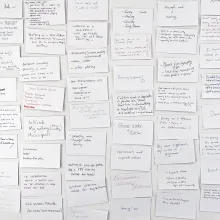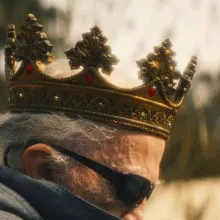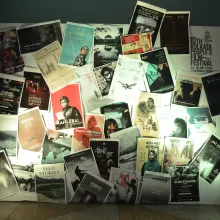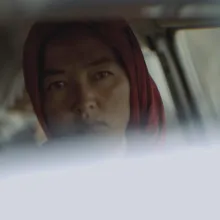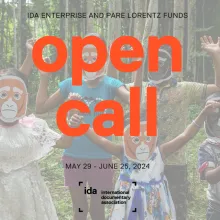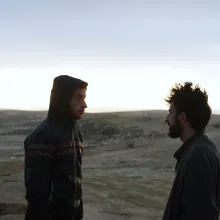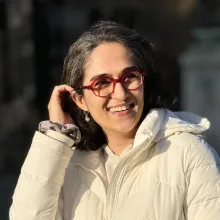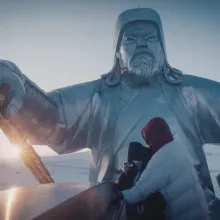Tommaso Santambrogio’s Oceans Are the Real Continents (2023), which opens on a black-and-white shot of an older Cuban woman sweeping her doorway, reminiscent of the indulgent, and seemingly quotidian scenes in Alfonso Cuarón’s Roma and Wim Wenders’ Perfect Days , is a film that captures the human condition in all its humor, pain and joy. Santambrogio’s debut docudrama feature, which premiered at Venice Days in 2023, is a triptych that follows three generations of characters in San Antonio de los Baños, where time seemingly stands still. Entrancingly poetic, Oceans Are the Real Continents
Latest Posts
Whether we are unemployed creatives, overwhelmed freelancers, or underpaid employees, it can often seem like everyone else has figured it out. Social media is a constant stream of people announcing new jobs, festival screenings, and prestigious grants and awards. Yet more often than not, the filmmaker who had the big premiere, received all the accolades, and even successfully sold their film is still struggling to get by, just like the rest of us. So how are filmmakers actually making a living?
Lance Oppenheim has had a productive year. His new feature Spermworld hit Hulu at the end of March, and now his three-part docuseries Ren Faire is airing on HBO, with episodes simultaneously showing up on MAX. The two projects happened nearly simultaneously, but while they both share Oppenheim’s highly stylized mode of documentary filmmaking, they center incredibly distinct casts of characters and situations. Ren Faire goes behind the scenes of the Texas Renaissance Festival , which for 50 years has been run by founder “King” George Coulam. In Coulam, the series has one of the more vivid
Chris Wilcha released his breakthrough film, the Slamdance award-winning documentary The Target Shoots First , in 2000. Like so many foundational Gen-X works—Douglas Coupland’s Generation X , for example, or movies like Reality Bites (1994) — it presumed that one of the worst things a twentysomething could do was “sell out.” In The Target Shoots First , this was examined through Wilcha’s vantage point working a day job at Columbia House, the infamous, then-omnipresent mail-order CD club that lured fans in with the initial promise of 8 CDs for a penny (followed by additional mandatory purchases
Two days before the 10th edition of the Kolkata People’s Film Festival (KPFF) began, India roiled in a frenzy of celebration. All the agencies of command and control announced the January 22 consecration of the Ram Mandir—the enthronement of the Hindu deity Rama in his alleged birthplace, Ayodhya—as a day for pomp and self-congratulation. Many states declared it a public holiday. The building of the Ram Mandir in the northern Indian state of Uttar Pradesh on the devastated powder of a 16th-century mosque, the Babri Masjid, which was dismantled brick by brick by Hindutva mobs in 1992—a friend once called this destruction one of the most fissiparous acts in the history of independent India—marked the psychic normalization of a supposedly secular democracy into a so-called Hindu Rashtra, a nation for and of Hindus.
In the midst of what seems to be endless global turmoil, it’s not surprising that the film program for this year’s Visions du Réel’s was on the sober side. The prelaunch press release for the 55th edition of the festival, with its headline “The Eye of the Storm,” stated as much. In a year in which I have all too often turned to fleeting entertainment for distraction, I felt driven to return to Nyon for the second year running . I wanted to immerse myself in global stories, in corners of the world I know nothing about and will likely never visit. I wanted to go to places where the challenges of
International Documentary Association (IDA) announced that applications for the organization’s flagship Enterprise Documentary Fund and Pare Lorentz Documentary Fund providing over $500,000 will be received through a unified Open Call using the Core Application beginning May 29, 2024. The application deadline is June 25 for non-IDA members and July 9 for IDA members. Learn more and apply here. Filmmakers can apply for the journalistically focused Enterprise Documentary Fund and the Pare Lorentz Documentary Fund. In addition to cash grants, IDA provides artist support and professional
Political statements are hardly foreign to a film festival’s red carpet, especially during such politically unsettled times. Yet there are statements that hold particularly immense power and urgency, in light of the inconceivable suffering and loss of civilian life in some parts of the world. Such were the ones calling for “Ceasefire Now [in Gaza],” stitched onto the back of the black dresses of Danish film producer Katrin Pors and American director Eliza Hittman, who trod the red carpet ahead of the 74th Berlin International Film Festival’s opening gala.
Elahe is an award-winning filmmaker. Her films include 'The Doll' (Critics Choice Nominee, IDA Nominee, Student Academy Awards, Best International Short Hot Docs 2021), 'Can I Hug You?' (Sheffield Doc/Fest 2023, SIMA Awards Best Short 2024), and 'A Move' (Visions du Réel 2024 Best Youth Jury Short) which spanned over 50 festivals and competitions, reflects her prowess in storytelling and women's rights advocacy. Elahe's projects are supported by IDA, One World Media; awarded on forums such as Dok Leipzig Short-n-sweet; and broadcasted/streamed via platforms such as NPO, VPRO, DW, VG, etc.
Filmed in Mongolia for over seven years, Daughter of Genghis follows Gerel, a 33-year-old loving single mother by day and a balaclava-wearing leader of a neo-nationalist gang by night. The tension between these two identities takes center stage in the debut feature of Danish photojournalists-turned-filmmakers Kristoffer Juel Poulsen and Christian Als. The film is both engaging as a portrayal Gerel’s troubling quest to protect, in her own words, “Mongol women, Mongol children, Mongol genes,” and moving in capturing her changing relationship with her son, Temuulen, who literally grows up in

